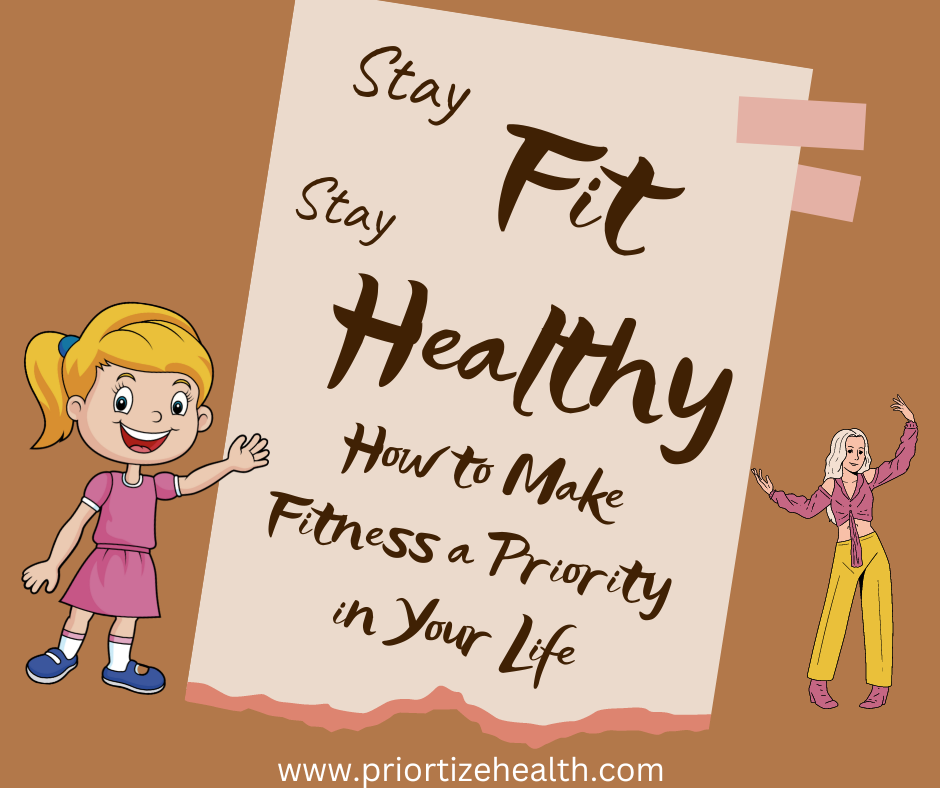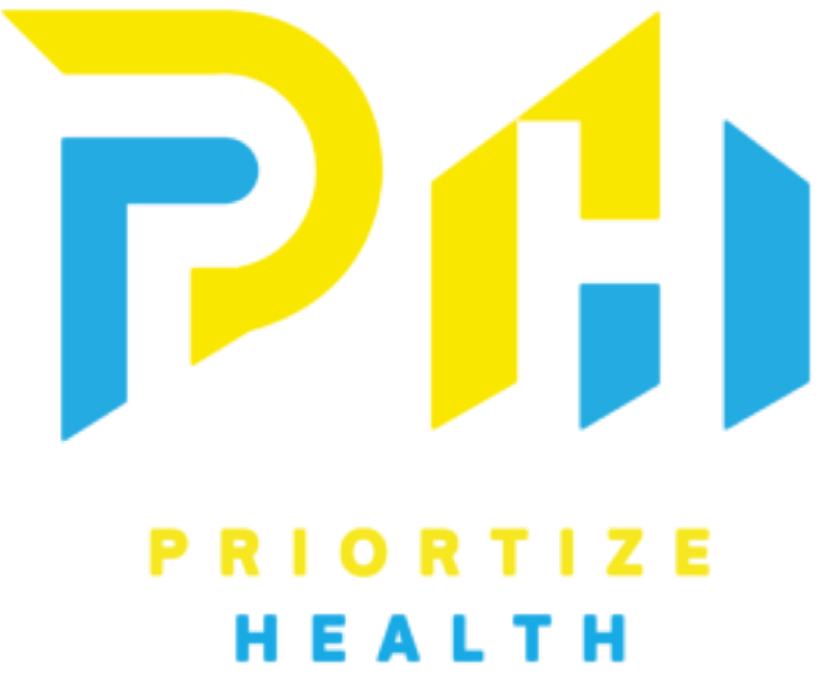
Stay Fit Stay Healthy: How to Make Fitness a Priority in Your Life
A good physical health and wellness is crucial for a happy life. Regular exercise and a healthy eating regimen can assist in preventing many medical issues. It can be heart disease, obesity, and depression. Today people have busy schedules and a sedentary lifestyle. In this way, it becomes challenging to focus on fitness. In this article, we’ll go through the advantages of staying fit and healthy. Let’s also understand how to make fitness a priority in your life. We should be aware of how to overcome general difficulties that may get in the way.
Understanding the Benefits of Staying Fit and Healthy
Staying fit and healthy has many physical and mental health benefits. Let’s understand some of them:
- Improved Physical Appearance: Regular exercise and healthy eating provides toned and attractive physique.
- Better Mood: Exercise helps to release endorphins. They are the body’s natural mood boosters.
- Reduced Risk of Chronic Diseases: Physical activity can assist in lowering the risk of developing chronic illness. It can be heart disease, stroke and type 2 diabetes.
- Increased Energy Levels: Regular exercise can increase energy levels. It assists you in feeling more awake and alert during the day.
- Improved Sleep: Exercise can help improve sleep quality. It allows you to feel more rested and refreshed in the morning.
- Increased Strength and Endurance: Regular exercise can help build strength and endurance. This makes it simpler to perform day to day exercises.
- Improved Cognitive Function: Exercise helps to improve cognitive function. It includes memory, attention and learning.
- Better Stress Management: Regular physical activity can help reduce stress levels. It provides a healthy outlet for coping with stress.
- Improved Flexibility and Balance: Exercise can help improve flexibility and balance. It decreases the risk of injury and working on actual capability.
- Enhanced Immune System: Regular physical activity helps to enhance the immune system. This assists with warding off infections and sickness.
- Increased Self-Confidence: Staying fit and healthy can boost self-confidence. It assists you with feeling sure and competent in your regular routine.
- Improved Cardiovascular Health: Regular exercise can improve cardiovascular health. It strengthens the heart and blood vessels.
- Better Joint Health: Physical activity assists in lowering the risk of conditions like osteoarthritis. It also helps to reduce joint pain.
- Increased Lung Capacity: Exercise can improve lung capacity and help increase oxygen uptake. This helps to improve our health.
- Better Digestion: Regular physical activity can help improve digestion. It can help to prevent digestive problems like constipation.
- Better Hormonal Balance: Exercise helps to regulate hormones. It improves health and reducing the risk of specific circumstances. They can be polycystic ovary syndrome (PCOS) and thyroid issues.
- Improved Bone Health: Regular physical activity can help build and maintain strong bones. It reduces the risk of osteoporosis and different circumstances.
- Increased Metabolism: Exercise can help boost metabolism. It permits you to burn more calories even when you are not working out.
- Better Sexual Function: Regular physical activity helps to improve sexual function. It is also beneficial in increasing libido.
- Increased Life Expectancy: Regular exercise and healthy eating can help increase life expectancy. It is also beneficial in improving the quality of life.
How to make fitness a Priority in Your Life
We should follow some guidelines to make fitness a priority in the life. These include:
A. Setting achievable fitness goals:
- Start with small, manageable goals: We should start our fitness journey by setting achievable goals. They should not overwhelm you. Start with small goals that are easy to achieve, such as going for a 10-minute walk every day, or doing 10 push-ups a day. As you get stronger and more confident, increase the difficulty of your goals.
- Set specific, measurable and time-bound goals: This is an important step. For example, instead of saying “I want to exercise more,” set a goal to “run 3 miles three times a week for the next month.” This type of goal is specific. It is measurable as you can track your progress by the miles you run. The time-boundness is the goal has a deadline.
B. Incorporating physical activity into your daily routine:
- Find an activity you enjoy: One of the keys to making physical activity a habit is to find an activity you enjoy. Some of the options are to take a walk, swim or cycle. You can play an outdoor game, find something that you appreciate doing and follow it.
- Make it a habit: The most effective way to guarantee that you adhere to your physical activity routine is to make it a habit. Attempt to exercise at the same time each day. Plan it into your schedule like you would with some other significant appointment. The more you do it, the more it will become a natural part of your day.
C. Eating a healthy diet:
- Nutrient-dense foods: Eating a healthy diet should foods that are nutrient-dense. They can vegetables, fruits, whole grains. We can also have lean proteins and healthy fats. These food sources will furnish your body with the fundamental vitamins, minerals, and nutrients. This will assist the body with working at its best.
- Limit eating processed and junk food: These food sources are high in calories, low in nutrients. They can add to weight gain and other health issues. Attempt to restrict your intake of these kinds of food varieties, and opt for healthier options instead.
D. Getting sufficient rest and sleep:
- Aim for 7-9 hours of sleep per night: Getting enough sleep is important for our health and well-being. Plan to get 7-9 hours of sleep each day. Attempt to lay out a consistent sleep schedule. This will help you to regulate your body’s internal clock.
- Create a bedtime routine: A bedtime routine can help you relax and prepare for sleep. Think about reading a book, having a warm bath. You can likewise practice relaxation methods to help you wind down at the end of the day. The key is to track down activities that work for yourself and that asist you fall asleep.
Overcoming Obstacles to Staying Fit and Healthy
A. Lack of time:
- Focus on fitness: If you don’t have enough time for fitness, it’s important to focus on it. Add it in your schedule. Set aside specific times for physical activity. Treat those times as non-negotiable appointments. You may break up your workout into limited timeframes over the course of the day. Do this if you can’t find a large chunk of time.
- Use short periods of free time: Use short periods to your advantage. Take a quick walk, do a few exercises, or do some stretching to keep your body moving. The more active you are, the simpler it will be to keep up your fitness level.
B. Lack of motivation:
- Find a way to perform fitness: You may have trouble motivating yourself to exercise. Consider finding a workout buddy or joining a fitness class. Having somebody to exercise with can make it more enjoyable and keep you responsible. Plus, you’ll be able to support each other and stay motivated.
- Reward yourself for meeting fitness goals: This can act as a great motivator. Consider setting a fitness goal. It can be running a certain distance or losing a certain amount of weight. Reward yourself with something you enjoy when you reach that goal. This can help keep you motivated and focused on your fitness journey.
C. Physical limitations or injuries:
- Consult a doctor or physical therapist: They can help you determine what exercises are safe for you. Discuss with them how to modify your fitness routine. It should help you to accommodate any limitations or injuries.
- Change your fitness routine as needed: Consult your doctor or physical therapist. They can help you determine what exercises are safe for you to do. You may need to focus on low-impact activities like swimming or cycling. With these injuries don’t do high-impact activities like running or jumping. The key is to listen to your body. Adjust your routine as needed to prevent further injury and promote healing.
FAQ’s:
Ans: There are many benefits to staying fit and healthy. Some of the most important include:
1. Improved physical health
2. Increased energy and stamina
3. Improved mental health
4. Better sleep
5. Improved self-esteem and confidence
6. Reduced stress and tension
7. Increased longevity
Ans: The golden rules of health are a set of guidelines. They can help you maintain good health and prevent disease. Here are some of the most important golden rules of health:
1. Eat a balanced diet
2. Stay hydrated
3. Get enough sleep
4. Exercise on regular basis
5. Avoid smoking and limit alcohol consumption
6. Manage stress
7. Get regular check-ups
8. Maintain a healthy weight
Ans: “Staying fit” refers to maintaining a level of physical fitness and good health. We can do it through regular exercise and healthy lifestyle choices. Fitness is a broad term. It can encompass many aspects of physical and mental well-being. This includes cardiovascular health, muscular strength and endurance. We should also take care of flexibility and body composition.
Staying fit involves making regular physical activity a part of your daily routine. We should engage in a variety of exercises that challenge your body and improve your fitness. It also involves making healthy food choices. Try to engage in habits that support good health. It can be getting enough sleep and managing stress.
The goal of staying fit is to maintain a high level of physical and mental well-being. It helps to reduce the risk of chronic diseases and other health problems. This is an ongoing process that requires commitment and consistency. There are many benefits including increased energy, better sleep and improved mood. It also helps to reduce risk of chronic disease.






4 Comments
[…] benefits of drinking water and you should know about them. Keeping ourselves hydrated helps us to stay fit and healthy. The amount of water we should drink vary from person to person. It depends on the age, sex, and […]
[…] benefits of drinking water and you should know about them. Keeping ourselves hydrated helps us to stay fit and healthy. The amount of water we should drink vary from person to person. It depends on the age, sex, and […]
[…] The ideal number of sit-ups per day varies from person to person. It depends on factors such as fitness level, goals, and health. Rather than fixating on a specific number, focus on the quality of your workouts. Increase the intensity in a gradual manner, and incorporate a well-rounded core training routine. Always focus on proper form and listen to your body. Consult with fitness professionals or healthcare providers when needed. Achieving a strong core is a journey that requires patience, consistency, and a holistic approach to fitness. […]
[…] The ideal number of sit-ups per day varies from person to person. It depends on factors such as fitness level, goals, and health. Rather than fixating on a specific number, focus on the quality of your workouts. Increase the intensity in a gradual manner, and incorporate a well-rounded core training routine. Always focus on proper form and listen to your body. Consult with fitness professionals or healthcare providers when needed. Achieving a strong core is a journey that requires patience, consistency, and a holistic approach to fitness. […]